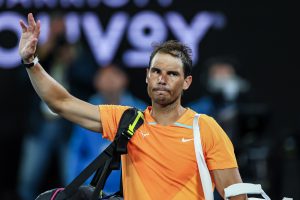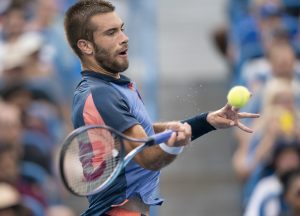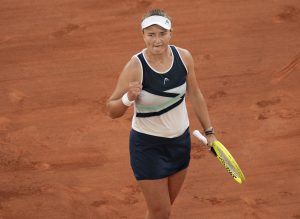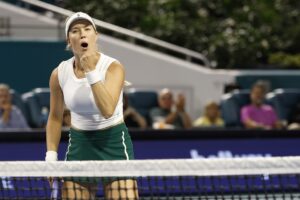Tennis is increasingly a numbers game. The seeming endless rise in the sheer number and range of statistics available (from rotations of the ball per second to average height of serve on the deuce side, with lots more in between) is undoubtedly a mine of information for those so inclined. But as we approach the 2019 French Open, there are two numbers that will potentially count above all others: two (or II, for those who prefer their numerals Roman), which would symbolise the number of times that Novak Djokovic will have held all four Majors consecutively if he wins; and twelve, to mark the Golden Dozen of French Open titles that Rafael Nadal will hold if he wins.
Even after what was a thrillingly open men’s clay-court season, in which the titles at Monte Carlo, Barcelona and Estoril were won by players from outside the new “big two” of Djokovic and Nadal (that is, by Fabio Fognini, Domnic Thiem and Stefanos Tsitsipas respectively), it is still virtually impossible to look beyond either Djokovic or Nadal as the eventual winner at Roland Garros. That is not only because they both rebooted impressively after early difficulties on the red dirt, winning the last two European clay-court Masters in Madrid (where Djokovic triumphed) and Rome (where Nadal won) between them. It is also because the final that they contested in Rome was on a level that had not been seen before on European clay this season, thereby proving that they remain by a long distance the two best players in the world, especially on clay.
That was despite the fact that Djokovic was clearly physically drained in the Final in Rome after an exhausting week in the Italian capital, which included late-night finishes against both Juan-Martin del Potro and Diego Schwartzman, two Argentine clay-court specialists, in the matches preceding the Foro Italico Final. As a result, he lost the first set of the Rome Final 6-0 and the third set 6-1, but by somehow winning the second set to force a third and deciding set, he reminded the tennis world (if it conceivably needed reminding) that after the King of Clay (Nadal), he is undoubtedly the Duke of Dirt.
With a clear week between the end of Rome and the start of the French Open in Paris, both Djokovic and Nadal can begin their challenge at Roland Garros in robust mental, physical, and even spiritual health. For one thing, as the top two seeds they cannot meet each other until the Final, which is the single-most important aspect of any draw or seeding system. For another, their efforts and achievements in the clay court season leading up to Paris will justifiably fill both of them with confidence.
As the 11-time winner in Paris, Nadal is justifiably the favourite for Roland Garros, as even Djokovic acknowledges, having said earlier this week to the BBC and others: “Nadal, number one favourite, without a doubt, then everyone else.” And yet the French Open is, of course, a Major, and it is also perfectly legitimate to argue that, for the moment at least, Djokovic is the Master of Majors.
Given that the Serb currently holds the Wimbledon, US Open, and Australian Open titles, all of which he has won in the last 10 months, it seems ever more baffling now that he could ever have gone off the boil so badly and for so long after securing his first “Nole Slam” (holding all four Majors consecutively, if not winning them all in the same calendar year, as with a Calendar or Genuine Grand Slam) at Paris three years ago. But of course that is precisely what did happen.
For all that Djokovic is undoubtedly the player of the second decade of the 21st century (having won all but one of his current haul of 16 Majors since 2010, as opposed to Nadal, who has “only” won 11 of his 17 Majors over the same period), it is also undoubtedly the case that neither Nadal nor Roger Federer have endured quite so deep a slump as Djokovic did between May 2016 and July 2018. He only finally emerged from his two-year decline last summer, when he won Wimbledon.
Consequently, there will potentially be a very pleasing symmetry for Djokovic if he can mark his complete return to form, and dominance, by winning in Paris again this year, to complete a second “Nole Slam” in the French capital and establish beyond doubt his current hegemony, even ahead of Nadal.
Having said that, however, it is arguable that the history that Nadal would achieve by winning the French Open again this year would be even more remarkable, because he would become the first tennis player of either gender to win the same Major 12 times. He currently shares the record of 11 with Margaret Court, but if he surpasses the great Australian his only peers for the almost complete annexation of a single great championship would not be found in tennis but in other sports, such as the great post-war Boston Celtics basketball side that reached 10 NBA Finals in succession and won nine of them.
Nevertheless, even the most devoted Celtics fan would struggle to make the case that their side faced anything like the degree of competition that Nadal has faced in the 14 years since he first triumphed in Paris, from Djokovic and Federer alone, let alone from other all-time great players like Andy Murray, Stan Wawrinka, and Juan Martin del Potro. As a result, if Nadal achieves a Golden Dozen in Paris in a fortnight’s time, it could be argued that his is the single greatest performance in any sport in the same tournament or championship ever.
So, as we count down towards Sunday, both Djokovic and Nadal literally stand on the brink of making even more history. However, whichever one of them wins, and it is extremely difficult to argue that one of them will not win the French Open this year, the biggest loser of all will be Roger Federer. The imperious Swiss may currently still hold the all-time record for most Major wins by a man, at 20, but either Nadal will move to within just two of that total, or Djokovic will move to within four and with the momentum to continue closing the gap.
That of course is the ultimate numbers game, not only in tennis itself but arguably in all of sport. Such has been the almost incomprehensible greatness of the three great “trivals” – Federer, Djokovic and Nadal – that any debate about whether they are the three greatest male tennis players ever was long ago decided in their favour. In the whole of sporting history, only the legendary heavyweight trio of Muhammad Ali, Joe Frasier and George Foreman from the 1970s comes anywhere close to the greatness of the “Fedalic” era.
In truth, however, boxing’s greatest golden age lasted barely half a decade, between the first Ali-Frasier fight in Madison Square Garden in 1971 and “The Fight” (as most boxing historians simply refer to it, although it is more poetically dubbed “The Thrilla in Manila”) between the same two men in 1975.
Consequently, on the eve of a potentially historic French Open Men’s Singles competition, Novak Djokovic and Rafael Nadal are arguably not simply competing for a single Major, or even a Major that could be decisive in their battle to catch and overhaul Federer’s total of 20 Majors, but the unofficial title of The Greatest Individual Sportsman Ever. And that is a prize that even these two supremely successful competitors would surely treasure.
Main Photo:
Embed from Getty Images






